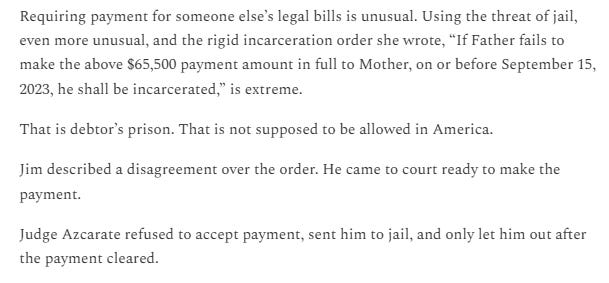Rick Luthmann and I were back for the second episode of The Unknown, as we’re calling it now.
We talked current events, the explosive RICO lawsuit alleging widespread bribery in Cook County, Illinois, and more.
Of particular interest, we talked about a case from Connecticut which brought back debtor’s prison.
Judge Tindill ordered Naidoo to pay attorney Cohen for her husband’s legal fees on or before May 1, 2024. When she did not pay, Judge Tindill held a hearing on July 18.
Naidoo explained in a letter posted on social media, “I did not have that type of money at the time, and I do not have that type of money… I had asked the judge for an extension of time to pay Gary Cohen, as I would only have the money to pay him once the property sold. The judge told me I could withdraw money from my retirement accounts, but I told her that I could not withdraw money from my retirement accounts to pay legal fees (there are only specific reasons you are allowed to withdraw money from retirement accounts). She was upset with this.”
At the July hearing, Naidoo told the judge that the rental property would be sold and closed by the end of August, at which time she would pay attorney Cohen in full.
In the meantime, Naidoo said in her social media post, “I offered to pay (Cohen) $2,500 (the maximum I could put on my credit cards) and the remainder when the property sold in a few weeks. He refused that offer.”
During the July hearing, Judge Tindill told Naidoo that attorney Cohen should not have to wait until the end of August, but that Naidoo must pay him by mid-August, or face arrest on August 14.
At the August 14 hearing, Naidoo’s ex-husband, Vipul R. Kumar, appearing in court, informed Judge Tindill that Naidoo was the sole provider and caregiver for their two minor children. He asked the judge not to incarcerate her.
Despite a reported closing date of the rental property on August 26, Judge Tindill reiterated Cohen needed to be paid immediately, not in 12 days. The judge ordered the mother arrested for contempt of her court orders
The story was broken by Frank Parlato of the Frank Report, but both Rick and I have experience with debtor’s prison being used like this.
Debtor’s prison’s abolition, Rick explained, was first proposed by Andrew Jackson. Here is part of his 1831 State of the Union address.
Actuated by similar views, Congress at their last session passed an act for the relief of certain insolvent debtors of the United States, but the provisions of that law have not been deemed such as were adequate to that relief to this unfortunate class of our fellow citizens which may be safely extended to them. The points in which the law appears to be defective will be particularly communicated by the Secretary of the Treasury, and I take pleasure in recommending such an extension of its provisions as will unfetter the enterprise of a valuable portion of our citizens and restore to them the means of usefulness to themselves and the community. While deliberating on this subject I would also recommend to your consideration the propriety of so modifying the laws for enforcing the payment of debts due either to the public or to individuals suing in the courts of the United States as to restrict the imprisonment of the person to cases of fraudulent concealment of property. The personal liberty of the citizen seems too sacred to be held, as in many cases it now is, at the will of a creditor to whom he is willing to surrender all the means he has of discharging his debt.
Debtor’s prison was abolished on the federal level a couple years later and by the states soon after.
About the only place it remains is in family court where back due child support can lend someone in jail.
{Check out the story below with Carlos Rivera, who spent six months in jail for back due child support}
It’s not only non-payment of child support which will land one in jail. Nonpayment of fees to guardian ad litem and other court appointees can land someone in jail as well.
In some cases, judges order one party to pay the fees of the other party’s attorney, and this too can land someone in jail. That’s the story that Frank Parlato broke, but it’s not the only one.
Late last year, I interviewed James Sisco, and he too spent a few days in jail after not paying his ex-wife’s attorney’s fees.
Check out the video from Bill Corbett, who interviewed Jim while in jail.
I described the situation further in my article.
Rick, writing about the case from Connecticut, also described similar situations he had come across.
NBC4 NY’s renowned investigative journalist Sarah Wallace and the I-team uncovered apparent corruption and misconduct by New York State Supreme Court Justice Kathleen C. Waterman-Marshall in Manhattan divorce court. Over six complaints to the New York State Commission on Judicial Conduct allege malfeasance, due process, and ethical violations.
According to the I-Team report and the New York County Clerk’s Docket for Geeta Kohli v. Sanjay Tewari, Index No.: 365297/2021, Dr. Tewari was ordered into “Debtor’s Prison” at Rikers Island for weeks because he could not immediately pay over $135,000.00 in attorney’s fees to Blank Rome LLP attorneys Brett Scott Ward and Grace Chamoun.
Dr. Tewari alleges that the financial interests of attorneys and court-appointed persons in the New York State Supreme and Family Court system are prioritized over the well-being of their clients and their families. His proof is, among other things, the two weeks he spent at Rikers’ Island for a civil legal bill, jailed for contempt while representing himself pro se and never having been afforded appointed counsel to represent him.
Check out the first episode of The Unknown below.

















Share this post